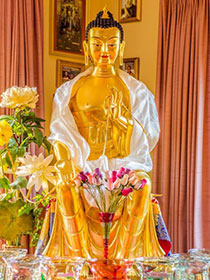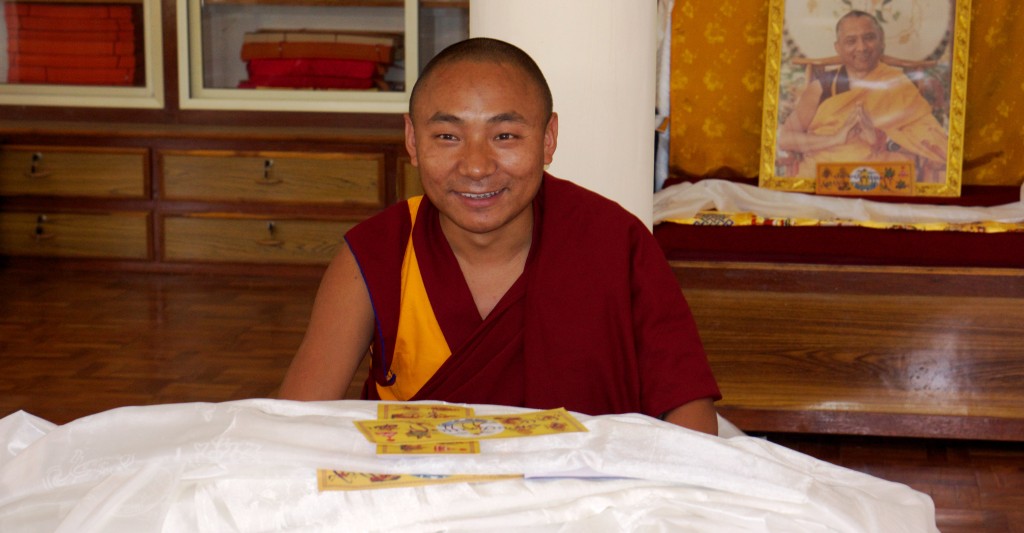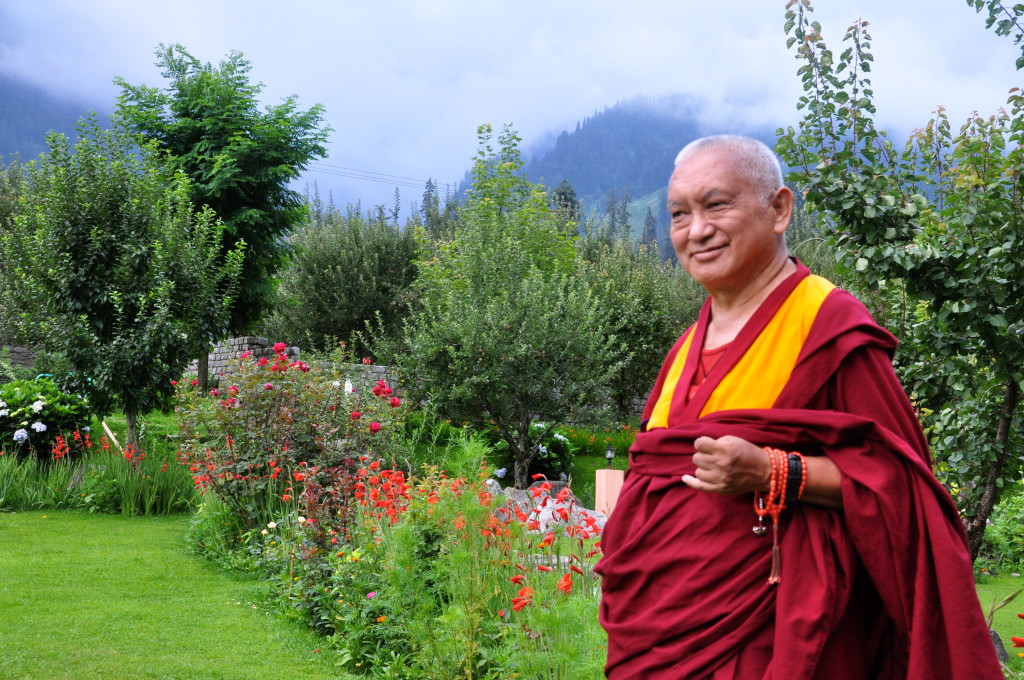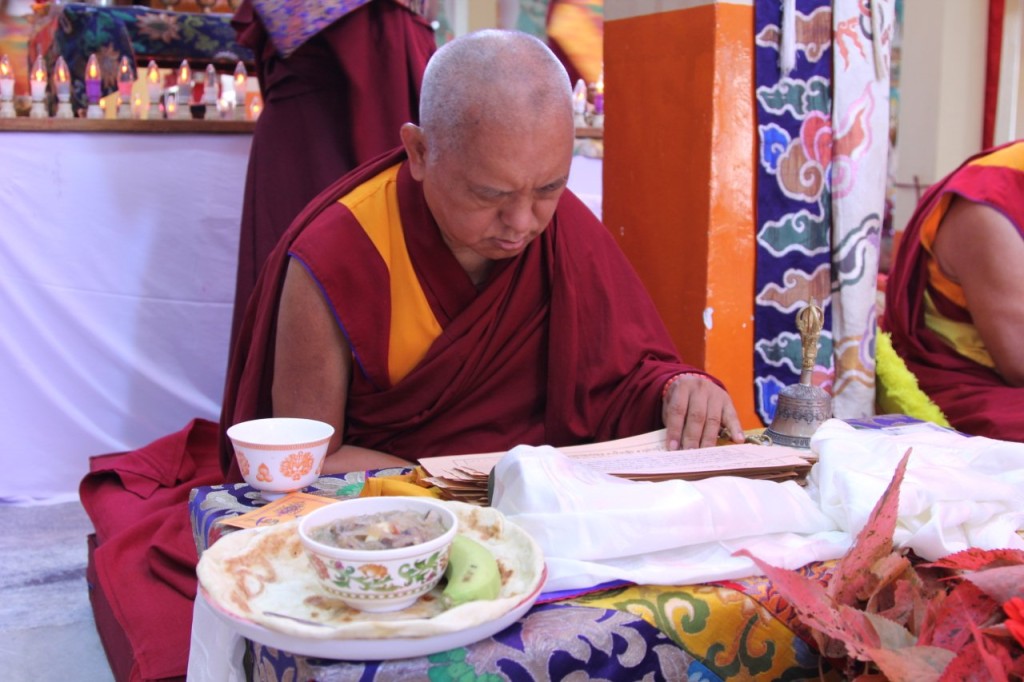- Home
- FPMT Homepage
Foundation for the Preservation of the Mahayana Tradition
The FPMT is an organization devoted to preserving and spreading Mahayana Buddhism worldwide by creating opportunities to listen, reflect, meditate, practice and actualize the unmistaken teachings of the Buddha and based on that experience spreading the Dharma to sentient beings. We provide integrated education through which people’s minds and hearts can be transformed into their highest potential for the benefit of others, inspired by an attitude of universal responsibility and service. We are committed to creating harmonious environments and helping all beings develop their full potential of infinite wisdom and compassion. Our organization is based on the Buddhist tradition of Lama Tsongkhapa of Tibet as taught to us by our founders Lama Thubten Yeshe and Lama Thubten Zopa Rinpoche.
- Willkommen
Die Stiftung zur Erhaltung der Mahayana Tradition (FPMT) ist eine Organisation, die sich weltweit für die Erhaltung und Verbreitung des Mahayana-Buddhismus einsetzt, indem sie Möglichkeiten schafft, den makellosen Lehren des Buddha zuzuhören, über sie zur reflektieren und zu meditieren und auf der Grundlage dieser Erfahrung das Dharma unter den Lebewesen zu verbreiten.
Wir bieten integrierte Schulungswege an, durch denen der Geist und das Herz der Menschen in ihr höchstes Potential verwandelt werden zum Wohl der anderen – inspiriert durch eine Haltung der universellen Verantwortung und dem Wunsch zu dienen. Wir haben uns verpflichtet, harmonische Umgebungen zu schaffen und allen Wesen zu helfen, ihr volles Potenzial unendlicher Weisheit und grenzenlosen Mitgefühls zu verwirklichen.
Unsere Organisation basiert auf der buddhistischen Tradition von Lama Tsongkhapa von Tibet, so wie sie uns von unseren Gründern Lama Thubten Yeshe und Lama Thubten Zopa Rinpoche gelehrt wird.
- Bienvenidos
La Fundación para la preservación de la tradición Mahayana (FPMT) es una organización que se dedica a preservar y difundir el budismo Mahayana en todo el mundo, creando oportunidades para escuchar, reflexionar, meditar, practicar y actualizar las enseñanzas inconfundibles de Buda y en base a esa experiencia difundir el Dharma a los seres.
Proporcionamos una educación integrada a través de la cual las mentes y los corazones de las personas se pueden transformar en su mayor potencial para el beneficio de los demás, inspirados por una actitud de responsabilidad y servicio universales. Estamos comprometidos a crear ambientes armoniosos y ayudar a todos los seres a desarrollar todo su potencial de infinita sabiduría y compasión.
Nuestra organización se basa en la tradición budista de Lama Tsongkhapa del Tíbet como nos lo enseñaron nuestros fundadores Lama Thubten Yeshe y Lama Zopa Rinpoche.
A continuación puede ver una lista de los centros y sus páginas web en su lengua preferida.
- Bienvenue
L’organisation de la FPMT a pour vocation la préservation et la diffusion du bouddhisme du mahayana dans le monde entier. Elle offre l’opportunité d’écouter, de réfléchir, de méditer, de pratiquer et de réaliser les enseignements excellents du Bouddha, pour ensuite transmettre le Dharma à tous les êtres. Nous proposons une formation intégrée grâce à laquelle le cœur et l’esprit de chacun peuvent accomplir leur potentiel le plus élevé pour le bien d’autrui, inspirés par le sens du service et une responsabilité universelle. Nous nous engageons à créer un environnement harmonieux et à aider tous les êtres à épanouir leur potentiel illimité de compassion et de sagesse. Notre organisation s’appuie sur la tradition guéloukpa de Lama Tsongkhapa du Tibet, telle qu’elle a été enseignée par nos fondateurs Lama Thoubtèn Yéshé et Lama Zopa Rinpoché.
Visitez le site de notre Editions Mahayana pour les traductions, conseils et nouvelles du Bureau international en français.
Voici une liste de centres et de leurs sites dans votre langue préférée
- Benvenuto
L’FPMT è un organizzazione il cui scopo è preservare e diffondere il Buddhismo Mahayana nel mondo, creando occasioni di ascolto, riflessione, meditazione e pratica dei perfetti insegnamenti del Buddha, al fine di attualizzare e diffondere il Dharma fra tutti gli esseri senzienti.
Offriamo un’educazione integrata, che può trasformare la mente e i cuori delle persone nel loro massimo potenziale, per il beneficio di tutti gli esseri, ispirati da un’attitudine di responsabilità universale e di servizio.
Il nostro obiettivo è quello di creare contesti armoniosi e aiutare tutti gli esseri a sviluppare in modo completo le proprie potenzialità di infinita saggezza e compassione.
La nostra organizzazione si basa sulla tradizione buddhista di Lama Tsongkhapa del Tibet, così come ci è stata insegnata dai nostri fondatori Lama Thubten Yeshe e Lama Zopa Rinpoche.
Di seguito potete trovare un elenco dei centri e dei loro siti nella lingua da voi prescelta.
- 欢迎 / 歡迎
简体中文
“护持大乘法脉基金会”( 英文简称:FPMT。全名:Foundation for the Preservation of the Mahayana Tradition) 是一个致力于护持和弘扬大乘佛法的国际佛教组织。我们提供听闻,思维,禅修,修行和实证佛陀无误教法的机会,以便让一切众生都能够享受佛法的指引和滋润。
我们全力创造和谐融洽的环境, 为人们提供解行并重的完整佛法教育,以便启发内在的环宇悲心及责任心,并开发内心所蕴藏的巨大潜能 — 无限的智慧与悲心 — 以便利益和服务一切有情。
FPMT的创办人是图腾耶喜喇嘛和喇嘛梭巴仁波切。我们所修习的是由两位上师所教导的,西藏喀巴大师的佛法传承。
繁體中文
護持大乘法脈基金會”( 英文簡稱:FPMT。全名:Found
ation for the Preservation of the Mahayana Tradition ) 是一個致力於護持和弘揚大乘佛法的國際佛教組織。我們提供聽聞, 思維,禪修,修行和實證佛陀無誤教法的機會,以便讓一切眾生都能 夠享受佛法的指引和滋潤。 我們全力創造和諧融洽的環境,
為人們提供解行並重的完整佛法教育,以便啟發內在的環宇悲心及責 任心,並開發內心所蘊藏的巨大潛能 — 無限的智慧與悲心 – – 以便利益和服務一切有情。 FPMT的創辦人是圖騰耶喜喇嘛和喇嘛梭巴仁波切。
我們所修習的是由兩位上師所教導的,西藏喀巴大師的佛法傳承。 察看道场信息:
- FPMT Homepage
- News/Media
-
- Study & Practice
-
-
- About FPMT Education Services
- Latest News
- Programs
- New to Buddhism?
- Buddhist Mind Science: Activating Your Potential
- Heart Advice for Death and Dying
- Discovering Buddhism
- Living in the Path
- Exploring Buddhism
- FPMT Basic Program
- FPMT Masters Program
- FPMT In-Depth Meditation Training
- Maitripa College
- Lotsawa Rinchen Zangpo Translator Program
- Universal Education for Compassion & Wisdom
- Online Learning Center
-
- Prayers & Practice Materials
- Overview of Prayers & Practices
- Full Catalogue of Prayers & Practice Materials
- Explore Popular Topics
- Benefiting Animals
- Chenrezig Resources
- Death & Dying Resources
- Lama Chopa (Guru Puja)
- Lama Zopa Rinpoche: Compendium of Precious Instructions
- Lama Zopa Rinpoche: Life Practice Advice
- Lama Zopa Rinpoche Practice Series
- Lamrim Resources
- Mantras
- Prayer Book Updates
- Purification Practices
- Sutras
- Thought Transformation (Lojong)
- Audio Materials
- Dharma Dates - Tibetan Calendar
- Translation Services
- Publishing Services
- Ways to Offer Support
- Prayers & Practice Materials
-
- Teachings and Advice
- Find Teachings and Advice
- Lama Zopa Rinpoche Advice Page
- Lama Zopa Rinpoche: Compendium of Precious Instructions
- Lama Zopa Rinpoche Video Teachings
- ༧སྐྱབས་རྗེ་བཟོད་པ་རིན་པོ་ཆེ་མཆོག་ནས་སྩལ་བའི་བཀའ་སློབ་བརྙན་འཕྲིན།
- Podcasts
- Lama Yeshe Wisdom Archive
- Buddhism FAQ
- Dharma for Young People
- Resources on Holy Objects
- Teachings and Advice
-
-
*If a menu item has a submenu clicking once will expand the menu clicking twice will open the page.
-
-
- Centers
-
- Teachers
-
- Projects
-
-
-
-
*If a menu item has a submenu clicking once will expand the menu clicking twice will open the page.
-
-
- FPMT
-
-
-
-
-
You can see from your own life experiences how the environment can affect you. When you’re among peaceful, generous, happy people, you’re inclined to feel happy and peaceful yourself. When you’re among angry, aggressive people, you tend to become like them. The human mind is like a mirror. Therefore, it is very important to be conscious of your surroundings and how they affect your mind.
Share
Lama Thubten Yeshe
-
-
-
- Shop
-
-
-
The Foundation Store is FPMT’s online shop and features a vast selection of Buddhist study and practice materials written or recommended by our lineage gurus. These items include homestudy programs, prayers and practices in PDF or eBook format, materials for children, and other resources to support practitioners.
Items displayed in the shop are made available for Dharma practice and educational purposes, and never for the purpose of profiting from their sale. Please read FPMT Foundation Store Policy Regarding Dharma Items for more information.
-
-
15
Open Your Heart to the Cost of Abundant Happiness
Sera Je Food Fund’s Dramatic Impact on the Monks of
Sera Je Monastery
By Geshe Thubten Jinpa
A 78-year-old monk walks back and forth two times every day for the meal being served in the main prayer hall of Sera Je Monastic University, situated in South India. After each meal, he comes back with a half-loaf of bread that he did not finish. I thought the leftover bread would go in the garbage bin, but I was wrong. He puts the bread in the sun and lets it dry. Later in the day when his young disciples come back hungry from class, he offers the dry piece of bread as a snack with a cup of black tea.
This old monk has been doing this for decades. Now it is just a habit, but 30 years ago he started this ritual out of helplessness and responsibility. In those days, senior monks who had young disciples had to save half of their food so that their young pupils could eat and be able to continue their studies in the evening without an empty stomach.
Some of the young monks who studied with him and received his dry bread each day are the most brilliant geshes today. They are now the main teachers for the young monks in the monastery and some are teaching in FPMT centers around the world and benefiting many people.
It was not an easy job to accept any new monks before the 1990s because when you accepted a new monk, you took full responsibility for his well-being, meaning you had to take care of his lodging, food, study and other material needs. It is as if you had become a parent to the new monk.
Geshe Wangchen, one of the oldest monks at Sera Je, remembers how stressful it was when he was receiving many new monks from Tibet and the Himalayas. Although he was joyful to have new monks come from far and wide to learn the Dharma, he understood the reality that they were now his complete responsibility. This was very challenging at that time, as every monk had to pay for their meals themselves. In the early ‘90s Geshe Wangchen could not afford to offer meals to his students, and so he had no choice but to share each of his own meals with three or four other monks in addition to organizing food – a heartbreaking porridge made out of just 1 kilo (2.2 pounds) of flour – for as many as 20 young disciples. Today, he appreciates so sincerely the Sera Je Food Fund that was established by Lama Zopa Rinpoche in 1991. Suddenly, the responsibility of providing for all the monks was lifted from him.
Geshe Nyima, a lharampa geshe (equivalent to a doctorate in Buddhist philosophy), is now teaching hundreds of monks more than six sessions every single day, despite his poor health. He suffers from gastric ulcers and is very weak, exemplifying the dangers of malnurishment at a young age. Geshe Nyima escaped Tibet in 1982, together with 15 other young monks, and arrived in India to study at Sera Je Monastery. Most of the friends with whom he escaped from Tibet became very ill due to the lack of nutrition and hygiene. Most of them gave up and either returned to Tibet or left for somewhere else. Geshe Nyima stayed on, but he struggled. All those who survived the early times are now in poor health, like Geshe Nyima.
Today, the Sera Je Food Fund provides highly nutritious meals, hygienically prepared for thousands of monks every day. Since the food fund started in 1991, the health of all the monks improved dramatically. They are now able to devote their full time to their Dharma studies without worrying about their meals or if they will have enough food. The most significant impact of the Sera Je Food Fund can be seen by the increase of numbers of the monks, and that senior monks like Geshe Wangchen are now able to accept as many new students as they can without worry.
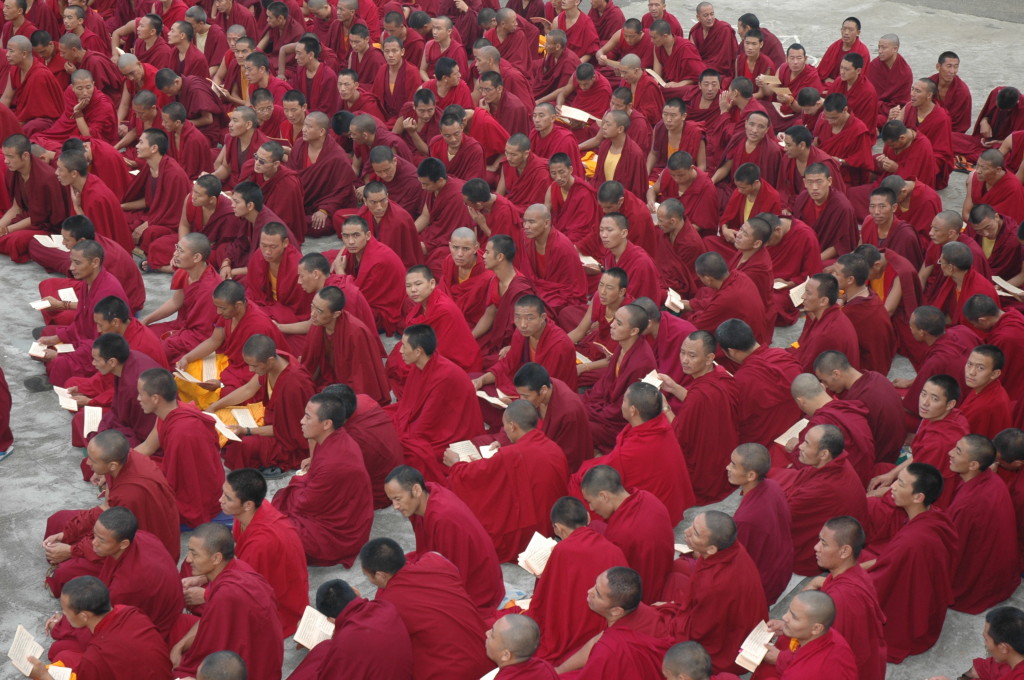
Approximately 2,500 monks study at Sera Je Monastery. The Sera Je Food Fund provides nutritious meals for all.
Sera Je Monastery now has the largest amount of monks studying Tibetan Buddhism and it is where most of the best scholars are produced. These scholars are, in turn, able to teach Dharma all over world and attract many new students, thus directly helping to preserve the Mahayana tradition.
Buddha’s teaching of love, compassion and interdependence is needed urgently, especially in today’s war-torn world. The complete teachings of Buddha consist of three vehicles including the Mahayana Vajrayana which is refined from the Nalanda tradition. This is alive only in Tibetan Buddhism and the survival of this invaluable wisdom depends solely on the sustainability of the great institutions such as Sera Je Monastic University. That’s why His Holiness the 14th Dalai Lama says, “It is due to these great monastic colleges that the profound, invaluable Buddha’s teaching is preserved and passed on without any corruption. Otherwise, humankind would have lost its most sacred relic long ago.”
Unfortunately, we live in a world where billions of dollars spent on manufacturing weapons every year, but in comparison, a great deal of struggle is required just to get the basic needs for an altruistic purpose such as supporting Sangha communities.
Yet, Lama Zopa Rinpoche’s wishes and determination are far more powerful and effective than any nuclear missile. He works so hard in trying to find anything that benefits sentient beings. He say, “When I am requesting someone to support any Dharma project, I am not only aiming to benefit the receiver but also the donors as well.”
Dharma is not just about studying, meditating or praying. It can be practiced in every part of our life. We can make whatever we do Dharma practice. We can support the great work of eliminating the suffering of others by supporting Dharma projects. It is not possible for everyone to engage in the serious Dharma study and practice, but your single contribution to support those who live their life abiding in morality and engaging in three trainings can be so meaningful. Your support not only benefits them but also you receive equal benefit.
Whatever we possess today, whether it be life, health or wealth, this does not exist inherently, and it is in the nature of impermanence, at any time it can change. So while you have this incredible situation, use it wisely. Use it to benefit others most, for example, by supporting Lama Zopa Rinpoche’s holy project, the Sera Je Food Fund, which has a dramatic impact on the monks of Sera Je Monastery and the preservation of the Mahayana tradition.
When you are making a contribution through Lama Zopa Rinpoche’s projects, it is like you are selecting the best marketing agency to market your product to generate everlasting profitable revenue. Because Lama Zopa Rinpoche is someone who is living a life truly in accord solely with Dharma. In today’s Buddhist community he is known as the great yogi (practitioner) of this modern age, he knows and teaches how to make the best out of everything we do. Your single contribution and merit accumulated through that is rejoiced in and dedicated after every practice Lama Zopa Rinpoche does – whether it be the longest food offering, overnight teachings, after saving a drowning insect from the water or during hours of meditation.
Bodhisattva Maitreya states in the Uttaratantra: “Buddha’s doctrine is categorized into two parts: scriptural Dharma – studying and teaching scriptures – and Dharma of realization – attaining realization by living in morality.” By supporting the Sangha community at Sera Je Monastery you are playing the best role in the preservation of Buddha’s teachings and service to all the buddhas and bodhisattvas and in this way contributing to happiness of all living beings.
Geshe Thubten Jinpa was ordained by Lama Zopa Rinpoche in 1990 and since then has studied and completed the geshe course at Kopan Monastery. He graduated as a rabjampa geshe from Kopan Monastery in 2010 and then after one year of intensive study and exams at Sera Je Monastery and University he was awarded with Special Geshe degree in 2012. Geshe Jinpa has also served as Lama Zopa Rinpoche’s second attendant.
You can read another moving piece by Geshe Jinpa, “Rejoice for the Wonderful Food Fund!”
Please check out photo galleries of daily breakfast, lunch and dinner options offered by the food fund.
The current cost to offer three meals a day, every day per year, to the 2,500 monks studying at Sera Je Monastery is US$280,000.
- Home
- News/Media
- Study & Practice
- About FPMT Education Services
- Latest News
- Programs
- New to Buddhism?
- Buddhist Mind Science: Activating Your Potential
- Heart Advice for Death and Dying
- Discovering Buddhism
- Living in the Path
- Exploring Buddhism
- FPMT Basic Program
- FPMT Masters Program
- FPMT In-Depth Meditation Training
- Maitripa College
- Lotsawa Rinchen Zangpo Translator Program
- Universal Education for Compassion & Wisdom
- Online Learning Center
- Prayers & Practice Materials
- Overview of Prayers & Practices
- Full Catalogue of Prayers & Practice Materials
- Explore Popular Topics
- Benefiting Animals
- Chenrezig Resources
- Death & Dying Resources
- Lama Chopa (Guru Puja)
- Lama Zopa Rinpoche: Compendium of Precious Instructions
- Lama Zopa Rinpoche: Life Practice Advice
- Lama Zopa Rinpoche Practice Series
- Lamrim Resources
- Mantras
- Prayer Book Updates
- Purification Practices
- Sutras
- Thought Transformation (Lojong)
- Audio Materials
- Dharma Dates – Tibetan Calendar
- Translation Services
- Publishing Services
- Teachings and Advice
- Find Teachings and Advice
- Lama Zopa Rinpoche Advice Page
- Lama Zopa Rinpoche: Compendium of Precious Instructions
- Lama Zopa Rinpoche Video Teachings
- ༧སྐྱབས་རྗེ་བཟོད་པ་རིན་པོ་ཆེ་མཆོག་ནས་སྩལ་བའི་བཀའ་སློབ་བརྙན་འཕྲིན།
- Podcasts
- Lama Yeshe Wisdom Archive
- Buddhism FAQ
- Dharma for Young People
- Resources on Holy Objects
- Ways to Offer Support
- Centers
- Teachers
- Projects
- Charitable Projects
- Make a Donation
- Applying for Grants
- News about Projects
- Other Projects within FPMT
- Support International Office
- Projects Photo Galleries
- Give Where Most Needed
- FPMT
- Shop
Translate*
*powered by Google TranslateTranslation of pages on fpmt.org is performed by Google Translate, a third party service which FPMT has no control over. The service provides automated computer translations that are only an approximation of the websites' original content. The translations should not be considered exact and only used as a rough guide.No matter whether you are a believer or a non-believer, religious or not religious, a Christian, Hindu, or a scientist, black or white, an Easterner or a Westerner, the most important thing to know is your own mind and how it works.







